Subscribe to our sister channel, ‘no pomo.’
And listen to our chat with Larry Chapp on Dorothy Day’s legacy, the Catholic Worker, and Pope Leo XIV’s impact on the US church on Spotify, Apple, or YouTube.
So this is a continuation of sorts of our piece on why we believe progressivism and traditionalism complement each other (and why the “liberal vs. conservative” paradigm is dumb), and on our other piece on the mimetic nature of ideological scripts.
Given that Cracks in PoMo is very much committed to “clarification of thought” (a la Peter Maurin) and metadiscursive commentary, we make a very big deal about cognitive dissonance and fruitless ideological deadlocks. We’ve celebrated the value of queer culture, grassroots co-ops, Panafricanism, and Islamic mysticism, and for this we are written off as “heretical blasphemers” and “retarded leftist scum.” We’ve warned of the dangers of anti-natalism, corporate DEI, and sodomy, and for this we are called “right-wing intellectuals,” “crypto-fascists,” and members of a sinister “ilk of conservative Catholics.”
It has always been strange to us that so many people blindly accept the right-coding of issues that are inherently progressive and vice versa. This mindless adherence to the script manufactured for us seems to have diminished people’s capacity to think through the logical implications of particular arguments. And because of this, Cracks in PoMo is very much drawn to—and committed to amplifying the voices of—figures who transcend such simplistic and faulty paradigms, and who introduce some much-needed nuance into the discourse: Camille Paglia, Pier Paolo Pasolini, Peter Maurin, Justin Giboney, John Milbank, Musa al-Gharbi, Simone Weil, Matthew B. Crawford, Andy Warhol, John Waters, Cornel West, Slavoj Zizek, Jean Baudrillard, Lorenzo Albacete, just to name a few.
Among our favorite figures to crack postmodernity are Dorothy Day and Destiny Herndon-De La Rosa. If you are not familiar with Destiny yet, we are not sure what’s wrong with you: We wrote about her in First Things, interviewed her on the pod twice (on her activism and on Dobbs), and have published her essays on AI and on tripping on shrooms. She is the foundress of the New Wave Feminists—a secular, feminist pro-life movement. Though Destiny considers herself agnostic, she is very much open to engaging with religious folks and ideas.
A visit to Maryhouse
Destiny hit me up a few months ago telling me that she would be visiting NYC and wanted to tour Maryhouse. In addition to being a fan of Dorothy Day’s social activism, she’s hopeful for Dorothy’s cause for canonization—she’d be the first saint (known) to have had (and repented for) an abortion. Further, Dorothy exemplifies the “Consistent Life Ethic” of which people like Destiny and other pro-life feminists tend to be vocal proponents. Her canonization would be a major boost for the pro-life movement, as it would affirm both the adverse effects of abortion on women (especially on poor ones) and would give post-abortive women hope for redemption and healing.
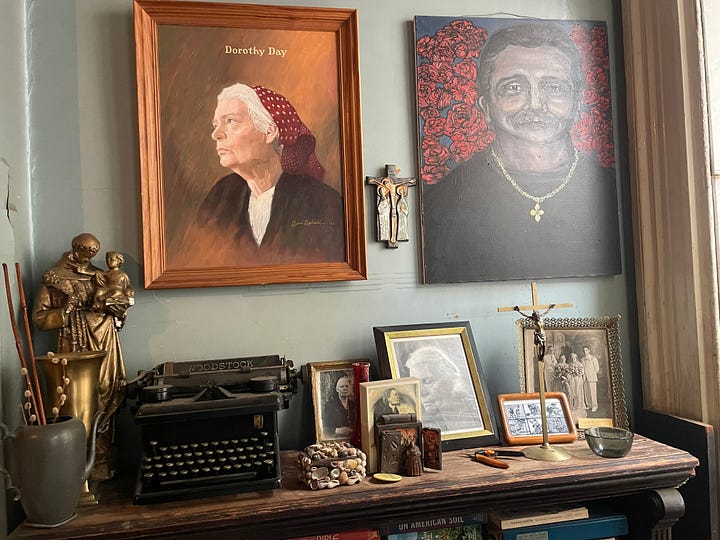
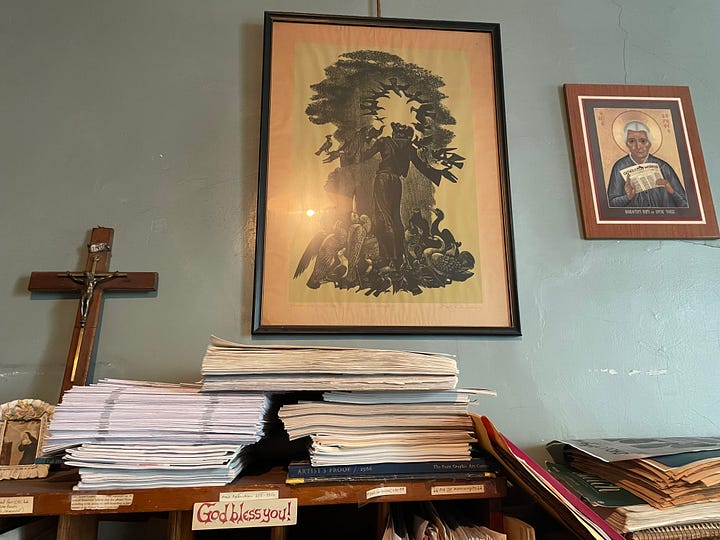
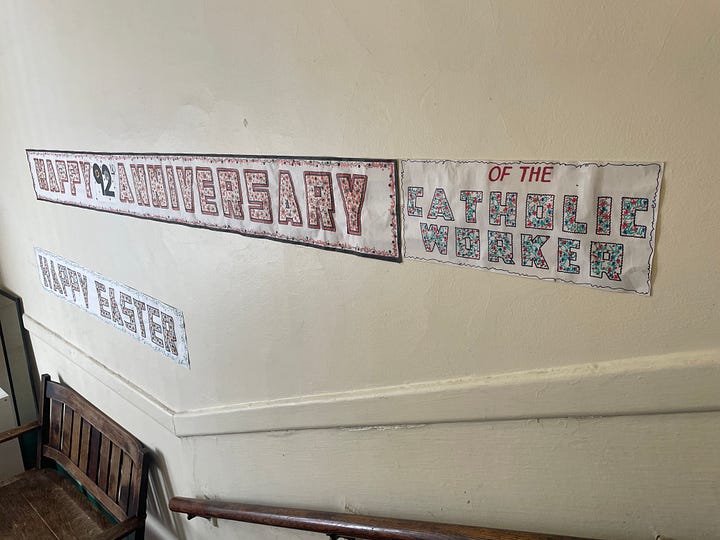

In addition to wanting to tour Dorothy’s old home, Destiny wanted to find out the truth behind Dorothy’s cigarette-smoking habit (a topic we have strong feelings about). She had recently gotten a tattoo of Dorothy smoking a bogie, and a former Catholic Worker told her that Dorothy didn’t actually smoke. After being warmly greeted by Joanne, we toured the offices, chapel, library, auditorium, and Dorothy’s bedroom. We saw an Easy Essay hand-written by Peter Maurin himself, and a paper with Forrester’s phone number that Dorothy kept pasted to her desk until the very end of her life.
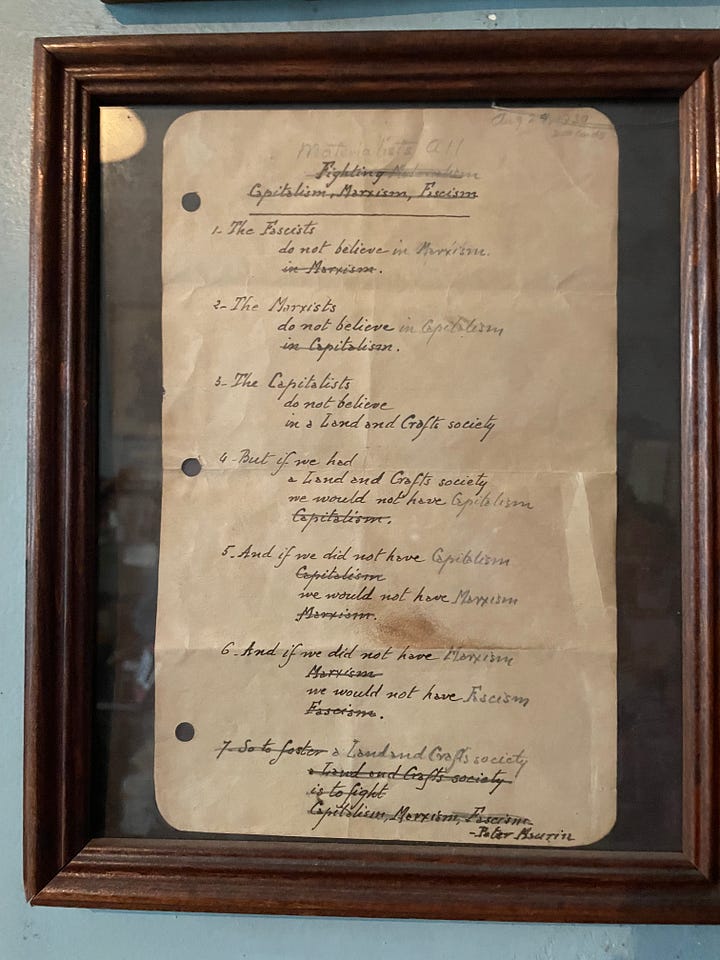

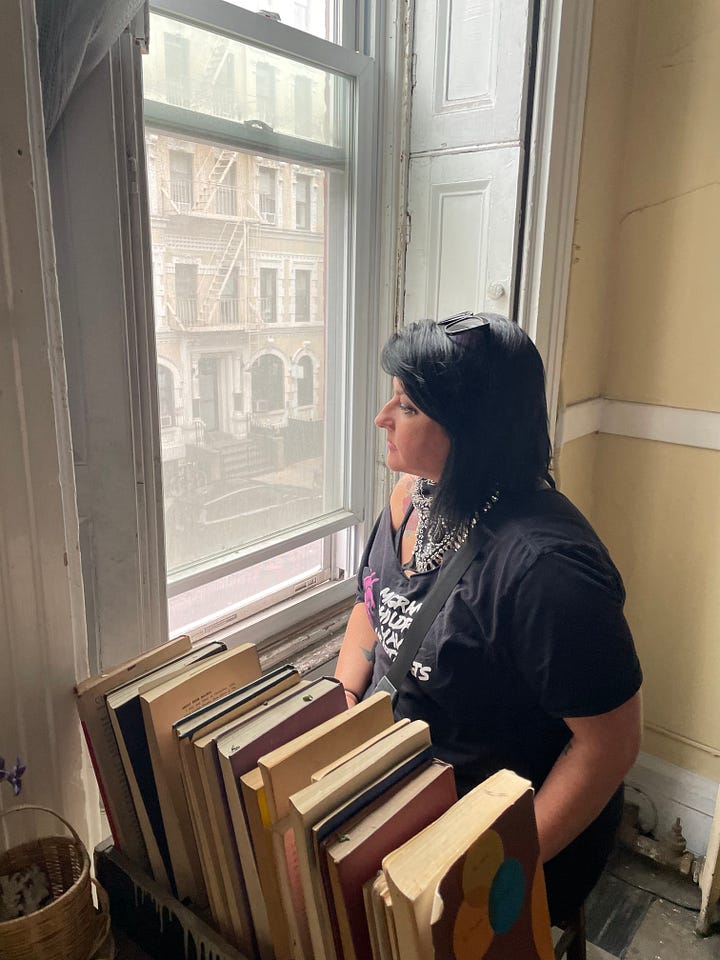
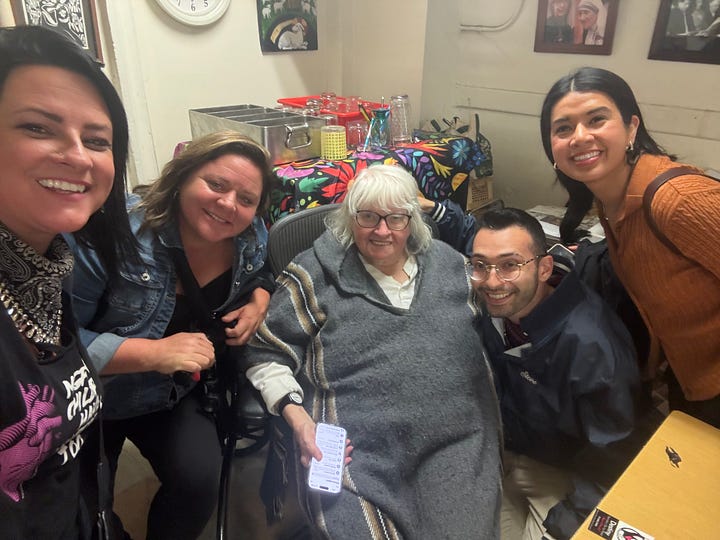
We eventually made our way down to the basement, where we spilled tea (both literally and figuratively) with Jane, an OG Catholic Worker who spent time with Dorothy back in the day. After Destiny explained New Wave Feminists’ mission and their the initiatives providing services to women in crisis pregnancies and their rescue houses for migrant women at the border, she asked Jane what the deal was with Dorothy’s smoking habit. Apparently she quit in the 1940s after being very much addicted. The trick, Dorothy learned, was not to pray to quit, but to pray for the desire to quit (she also was asked by her priest to start smoking again after quitting one Lent because the other Workers found her so unbearable to be around sans nicotine).
Before leaving Maryhouse, it was only fitting that we lit up some cigs and blew bubbles out front with a CW resident. We then dropped by Saint Joseph House, the Church of the Redeemer (where Dorothy’s funeral was), and passed a street mural recently painted of Dorothy in a nearby public park.
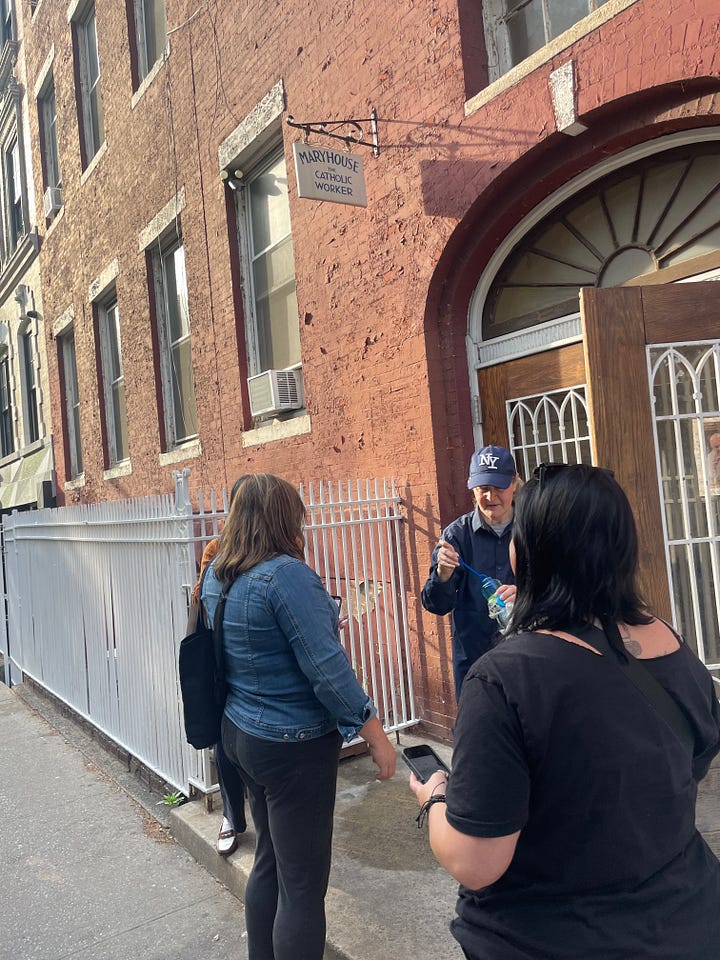
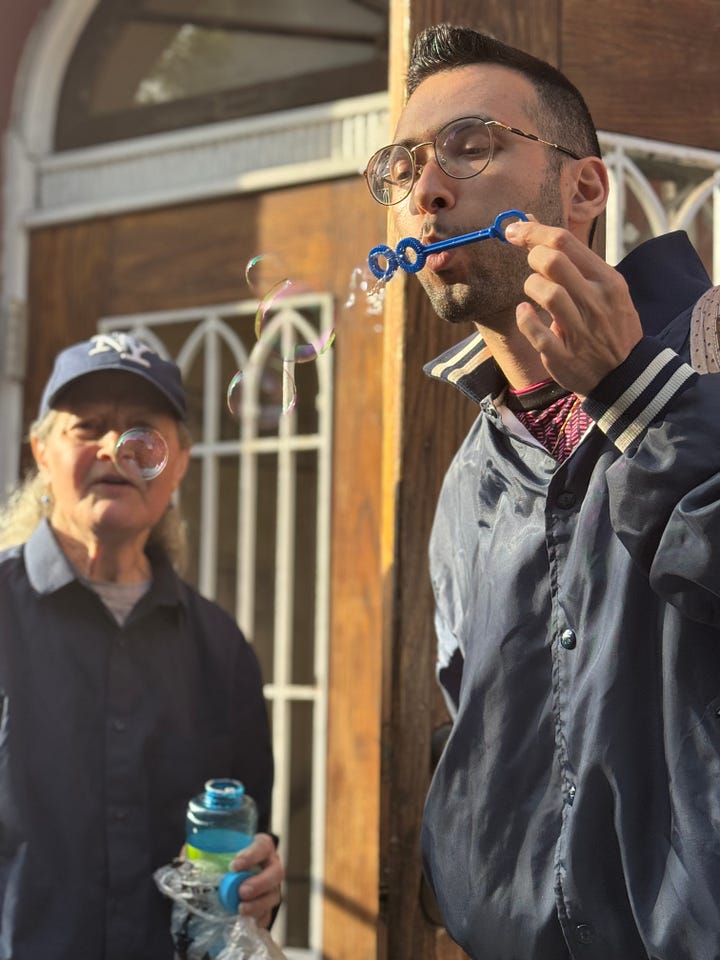
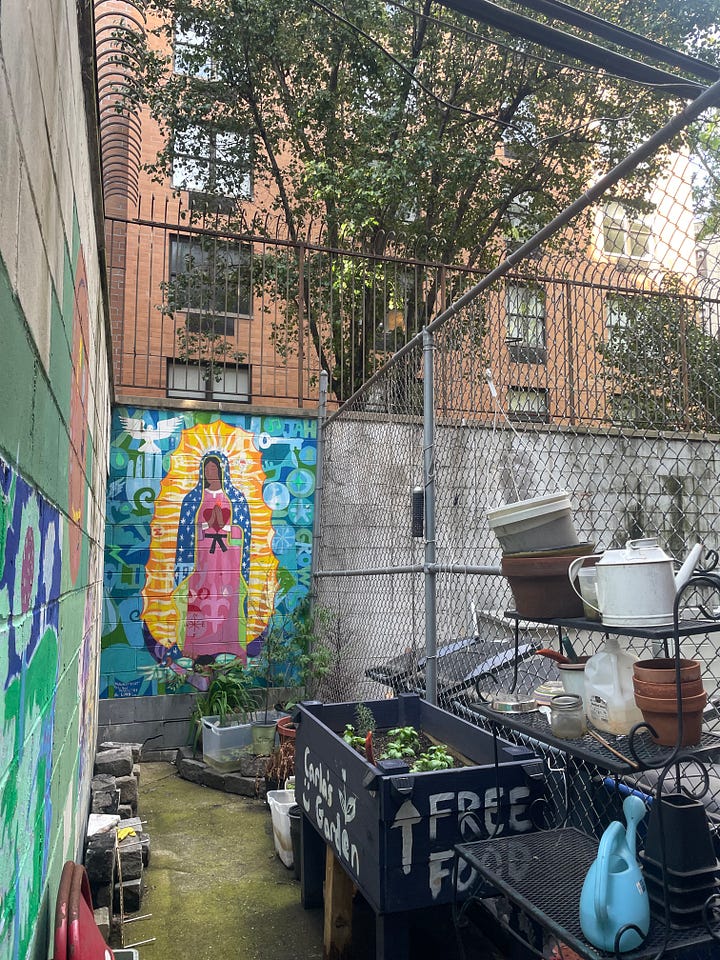
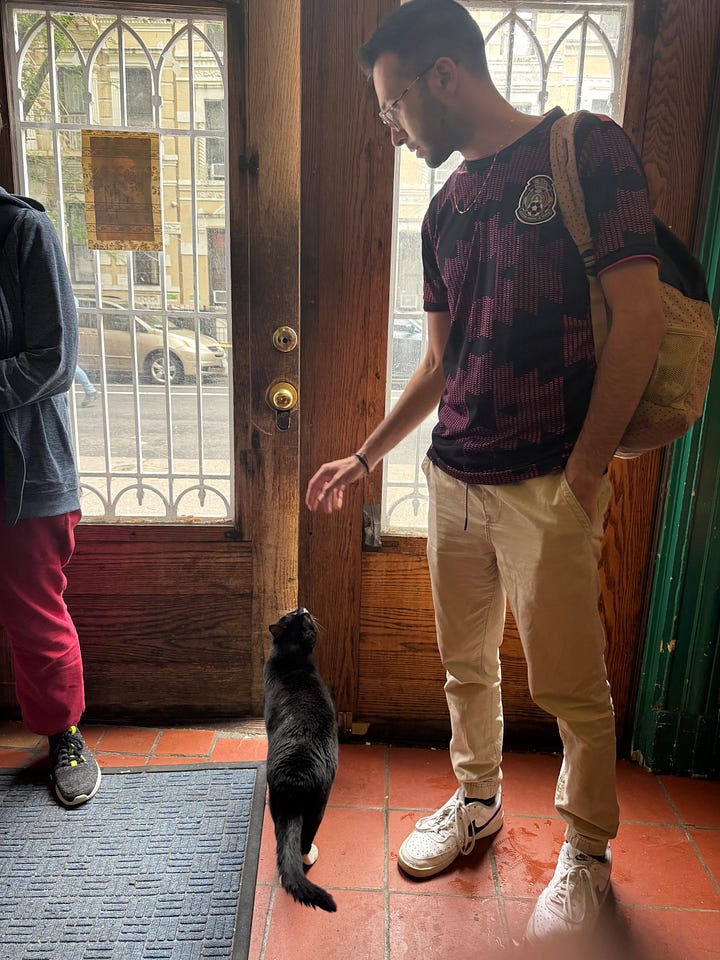
In an effort to prove to her how much NY is superior to Texas (more on this drama in our first pod episode), I took her to Ayat to savor the greatest Palestinian food that exists outside of [what’s left of] Palestine. (Ironically—or providentially—Ayat opened up a new location not far from where Destiny lives in Texas a week later.) While experiencing intense pleasure from eating the shawarma, labneh, muhammara, fried halloumi, and pizza with za’atar spices, Destiny shared her stories from the trenches, telling us about her attempts to widen the conversation on abortion to include discussion of the social safety net, femicide, r*pe, toxic masc, immigration, and other issues typically ignored by conventional pro-life pundits.
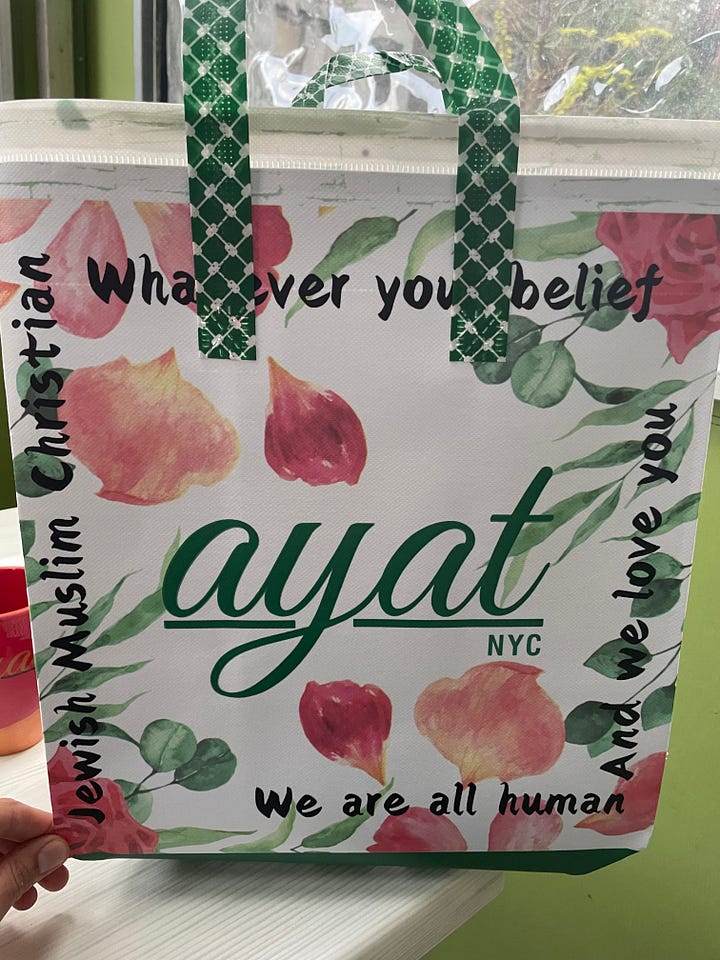
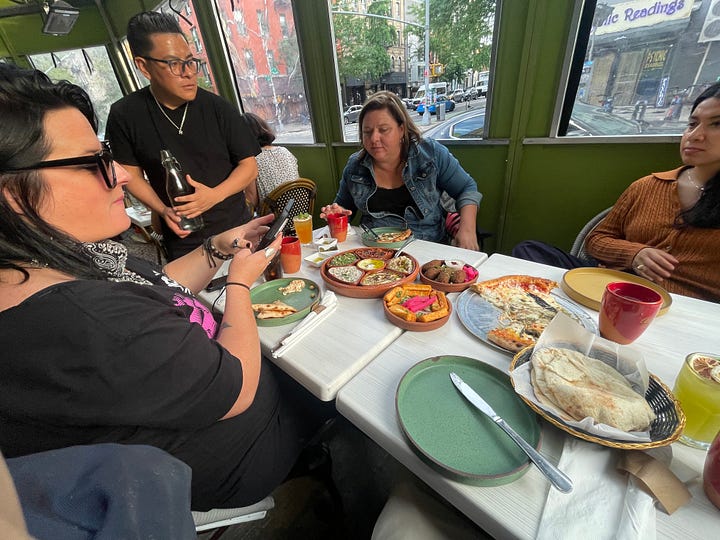
DISCLAIMER: If you have very strong beliefs for or against abortion and have made it this far, we give you a lot of credit. We remind you that this post is not here to make an argument for or against the legalization of abortion. This is a metadiscursive commentary. By all means, be for or against abortion. Agree or disagree with Destiny or Dorothy. You do you, gurl!
Why is pro-abortion left-coded+anti-abortion right-coded?
I find it perplexing how Destiny constantly has to explain her position to people, who fear that she’s suffering some kind of cognitive dissonance (or that she’s being paid by fascists to subvert the left from within). It’s strange how abortion rights have become a kind of left-coded issue. The right to terminate a pregnancy is conventionally framed as a matter of “progress,” but for whom and toward what? (Teddy Duncan wrote a brilliant piece in Compact on this topic last month btw.)
Obvi, I understand that the rights of the fetus are debatable. Who really knows when it counts as a full blown human being? But at the end of the day, terminating a fetus’ development is hardly a “neutral” action—let alone a noble one. We can debate whether it constitutes murder. One can argue that a woman should have the right to make that tough decision. But if one is going to argue in favor of a legal right, I don’t see how they can make that argument outside of defending it is a necessary evil (a la “safe, rare, & legal”)…not as a right that actively furthers the progress of the oppressed.
Paglia—who is ardently pro-choice—was under no delusion that her position was the morally inferior one, and that pro-lifers were taking the heroic high ground for defending the dignity of those who couldn’t defend themselves.1 The pro-choice position is that of the Nietzschean triumph of the strong over the weak—which is fine if you, like Paglia, are libertarian, pro-capitalist, or a neo-pagan.
Despite my pro-abortion stance (I call the term pro-choice “a cowardly euphemism”), I profoundly respect the pro-life viewpoint, which I think has the moral high ground…The silence from second-wave feminists about the ethical ambiguities in their pro-choice belief system has been deafening.[…]
Pro-choice Democrats have become “callous and extreme” about abortion. There is a moral hollowness at the core of Western careerist feminism, a bourgeois secular code that sees children as an obstruction to self-realization or as a management problem to be farmed out to working-class nannies.
In our second pod discussion, I expressed my fear to Destiny that many pro-lifers are naive about their cause: To ban abortion would require a massive “conversion” of our nation’s culture. This is a society that prizes capital, consumption, individualism, and that is no stranger to violence and corruption. How could you push for laws that defend the dignity of the most vulnerable, of those who contribute nothing to society in “a culture of death”? How could you put limits on the freedom of people to “do as they wilt,” to live hedonistic lives consuming endless pleasures and staving off the consequences?
Of course, I’m being hyperbolic. But you get my point. I just find it strange how a position that is inherently decadent and individualistic can be coded as a progressive one. I have the same query about the left-coding of gay marriage and divorce…and about self-proclaimed socialists/anti-capitalists using apps like Tinder or Grindr (sexualized consumer capitalism).
Surely, I understand that there is a case to be made in favor of how abortion rights protects the dignity of downtrodden, vulnerable women—and thus is indeed a progressive issue. But this argument only holds up if you’re using a purely materialist framework (which is a really flimsy one).
This is why I find people like Destiny, and other Consistent Life Ethic folks (Charlie Camosy, the American Solidarity Party), pro-life feminists (Erika Bachiochi, Leah Libresco Sargeant), and progressive pro-lifers to be really interesting. In addition to challenging the idea that abortion rights are progressive, they challenge the cognitive dissonance of right-leaning pro-lifers…too many of whom are naive about the ways that neoconservative economic policies encourage abortion—both on a cultural and economic level.
Furthermore, they tend to alienate people with their moralistic posturing. If you got pregnant because you’re a big heaux, you’re likely to be very turned off by the people swinging rosaries, holding posters with fetuses on them, and shouting “abortion is murder!” outside Planned Parenthood, and are probably gonna go through with your abortion. They also tend to ignore the extent to which toxic masc (cringe) is more likely to get women into situations where they’re tempted to get an abortion. Also, many pro-lifers are racist, as Gloria Purvis pointed out, which is ironic because so was the founder of Planned Parenthood. (Also the argument that a fetus has “rights” is silly—no one has rights! The problem with abortion is that it destroys a woman’s sense of dignity—and thereby, her life. The baby is fine—it will probably go to heaven.)
Dorothy’s Postmodern Anarchism
I recently got an ad on Spotify (since I refuse to renew my Premium account—despite Spotify’s aggressive attempts to drag me back) for the Modern Anarchy podcast. The podcast, hosted by a queer sex therapist and “pleasure activist” who goes by “Nicole,” promises to help you explore “opening up your relationship, navigating jealousy in non-monogamy, or expanding your sexuality through playful kink and radical ecstasy.”
I couldn’t help but think of our friend Dorothy, who went from being an anarcho-syndicalist (IWW) to being a Christian anarchist. Dorothy’s anarchism revolved around a radical interpretation of the principle of subsidiarity, emphasizing the responsibility of everyday people to take care of themselves and their neighbors, rather than focusing on acquiring as much wealth as possible for oneself and then expecting the government (or the Invisible Hand) to take care of the needs of their neighbor.
After her conversion to Catholicism, her anarchism went on to take a more spiritual—and moral—bent: It was imperative that those committed to the cause of the poor and to fighting against the corruption of capitalism must live humble lives of spiritual and material poverty, rejecting self-indulgence and orienting their life toward self-gift and communion with God and others. Dorothy’s opposition to abortion, contraception, fornication, and open homosexuality were not purely “moralistic” (because the Bible/Church said so), but because she recognized how free love served to further entrench the individualistic ethos of consumer capitalism, and ultimately took a toll on the poor, whose survival depended on moral and familial stability. (Of course, self-indulgence and amorality take a toll on the wealthy as well, but it’s easier for them to mask it, to use their money to pad themselves against the adverse effects of their decadence.)
Dorothy struggled when hippies came to the Catholic Worker in the late 1960s and early 1970s parading their commitment to the poor as well as to “sexual anarchism.” The cognitive dissonance boggled her: How could you advocate for the poor and against capitalism when you refuse to live a life of spiritual poverty and opt instead to live as a “sexual consumerist”? In here eyes, chastity is a “progressive” value. (More on this in Dan Hitchens’s piece in First Things and my piece in America.)
To her credit, she tried to challenge these naive youngsters without being overly prudish or judgmental toward them. She attempted to convey to them that sexual pleasure is neither a toy to be mindlessly played with nor a shameful thing to be hidden. Rather, it is an incredibly beautiful gift from God that’s worth treasuring like a fine wine—a gift so good, that it should be offered back to God in gratitude, and used only when He wills us to do so.
The idea that we need to untether sexual pleasure from its natural ends of (permanent) unity and procreation in order to achieve true “freedom” naively overlooks the reality of how Original Sin bends our pursuit of pleasure toward corruption, manipulation, and violence. Despite our good intentions, we can easily allow our pursuit of pleasure to turn us into monsters who will sacrifice the dignity of others on the altar of our instinctive urges.
As Pasolini warned (who despite being a gay communist, was no fan of abortion), entities in power that promise us greater freedom to “be ourselves” and “express our true desires” can easily co-opt our newfound “freedom,” taking advantage of our diminished sense of reason and agency (the result of exalting pleasure and self-expression above all other things) to further their own power and to breakdown any lasting buffers we have against them (the family, community, etc). The result is not greater freedom and individualism, but greater manipulation and conformism.
I find it ironic that an ostensibly progressive, “anarchist” podcast is paying to put ads on an app run by one of the wealthiest corporations in the globe. I suppose grassroots promotional efforts were not enough for them to get the kind of publicity they wanted. Marketing ideas that diminish human dignity and agency and that exalt the cult of unfettered consumption as “progressive,” “radical,” or “liberating” are a prime example of what Olufemi Taiwo calls “elite capture.”
The End
So, was Dorothy a conservative prude or a progressive radical? We’ll leave it up to you to decide. But she was certainly onto something. So is Destiny. That’s why we like them so much.
Again feel free to take your position on hot button issues. We’re not here to change your politics since we are not a political platform (that would be cringe, if we were lol). But if you take anything from this post, it’s that you should be cautious to avoid blindly accepting the “coding,” the script handed down to you from on high—and lose sight of what’s really going on. Use your reason. Think about things. Talk to people. And for Allah’s sake, stop being so cringe.
Liberals routinely delude themselves with shrill propaganda about the motivation of “anti-woman” pro-life supporters. Hillary deals in those smears as her stock in trade: for example, while campaigning last week, she said in the context of Trump’s comments on abortion, “Women’s health is under assault in America”—as if difficulty in obtaining an abortion is more of an assault than the grisly intervention required for surgical termination of a pregnancy. Who is the real victim here? […]
To project sex phobia onto all pro-lifers is vulgar. Although I am an atheist who worships only great nature, I recognize the superior moral beauty of religious doctrine that defends the sanctity of life. The quality of idea and language in the Catechism of the Catholic Church, for example, exceeds anything in grimly utilitarian feminism. In regard to the Commandment “Thou shalt not kill,” the Catechism says: “Human life is sacred because from its beginning it involves the creative action of God….God alone is the Lord of life from its beginning until its end: no one can under any circumstance claim for himself the right directly to destroy an innocent human being” (#2258). Or this: “Human life must be respected and protected absolutely from the moment of conception. From the first moment of his existence, a human being must be recognized as having the rights of a person—among which is the inviolable right of every innocent being to life” (#2270).
There are abundant contradictions in a liberal feminism that supports abortion yet opposes capital punishment. The violence intrinsic to abortion cannot be wished away by magical thinking. As I wrote: “Abortion pits the stronger against the weaker, and only one survives.” My program is more ideologically consistent, because I vigorously support abortion but also call for the death penalty for horrific crimes such as political assassination or serial rape-murder. However, the ultimate issue in the abortion debate is that, in a modern democracy, law and government must remain neutral toward religion, which cannot impose its expectations or values on non-believers.
In an in-depth piece in the Boston Globe two years ago, Ruth Graham summarizes one view of the controversial emerging concept of fetal rights in cases where a pregnant woman has been attacked or killed: “It is progressives who have historically pushed to expand civil rights, yet who now find themselves concerned about the expansion of rights to fetuses.” Progressives need to do some soul-searching about their reflex rhetoric in demeaning the pro-life cause. A liberal credo that is variously anti-war, anti-fur, vegan, and committed to environmental protection of endangered species like the sage grouse or spotted owl should not be so stridently withholding its imagination and compassion from the unborn.
-Feminists have abortion wrong, Trump and Hillary miscues highlight a frozen national debate, Salon
The problem with the abortion rights crusade is that it is locked in a secular mind-set of me-first entitlement. Religious objections to abortion are based on devout study of the Bible, understood by believers as the word of God. "Be fruitful, and multiply" (Gen. 1:28): it is not enough to respond that this admonition to a small, struggling ancient people may no longer be applicable to an overpopulated world of dwindling resources. Theologians are not grocery managers taking inventory. For the faithful, God's plan is beyond human understanding, and one cannot pick and choose among his commands.
To rescue feminism, we must give religion its due but require it to stay in its place. Again, Judeo-Christianity is only half our tradition. Paganism has other paradigms to offer. The militant virgin goddesses, Athena and Artemis, with their cold autonomy, are heroines of mine. Plato speaks of two Aphrodites, a common one of physical childbirth and the other, the Uranian, patron of spiritual and intellectual influence, specially associated with homoerotic relations. Evasion of nature's biological imperative is distinctly human. I take the extreme view of that Enlightenment neopagan, the Marquis de Sade, who lauds abortion and sodomy for their bold frustration of mother nature's relentless fertility. My code of modern Amazonism says that nature's fascist scheme of menstruation and procreation should be defied, as a gross infringement of woman's free will.
Unlike the feminist establishment, I recognize that abortion is killing. But slaughter and harvest — symbolized by the sickle crescent of the moon goddess (which appears as a castrating blade in Picasso's Les Demoiselles d 'Avignon) — are the record of human sustenance and survival for ten thousand years. A pagan vision, like that of Tennessee Williams's Suddenly, Last Summer, will see the terrifying mass destruction in nature's procreative plan. Nature scatters a billion seeds to the wind. We must philosophically strengthen feminist theory so that it can admit that abortion is an aggressive act, that it is a form of extermination. Modern woman has become an agent of Darwinian triage. It is or should be ethically troubling: abortion pits the stronger against the weaker, and only one survives. The feminist coat-hanger symbol, prophesying the return of back-alley butchery if abortion is regulated or banned, is dishonest. A small number of women may die in botched procedures, but in successful abortions, the fetus death rate is 100 percent.
As a libertarian, I support unrestricted access to abortion because I have reasoned that my absolute right to my body takes precedence over the brute claims of mother nature, who wants to reduce women to their animal function as breeders. Women who want to achieve are at war with nature, as is shown by the hormonally disordering effects of career stress or extreme athletic training. In the Seventies, women runners, developing amenorrhea and calcium related shin splints, were the first to realize that nature is hovering over us, ready to shut down our systems if our fetus-feeding fat reserve drops below a certain percentage of body weight. In other words, in nature's eyes we are nothing but milk sacs and fat deposits. Women inspired by the Uranian Aphrodite to produce spiritual progeny should view abortion as a sword of self-defense put into their hands by Ares, the war god. Government, guaranteeing freedom of religion, has no right to interfere in our quarrel with our Creator, in this case pagan nature. Under the carnal constitution that precedes social citizenship, women have the right to bear arms. The battlefield is internal, and it belongs to us.
-”No Law in the Arena,” Vamps and Tramps


